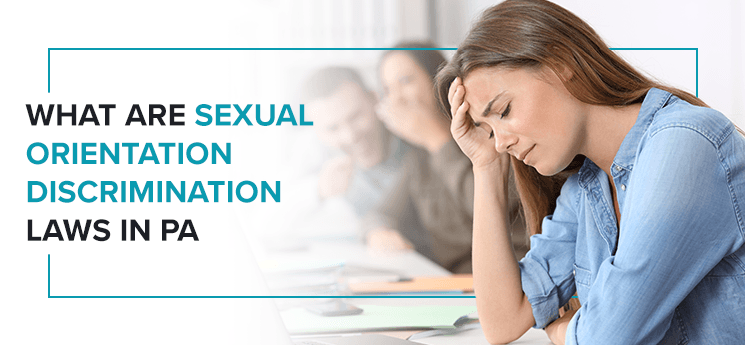
Your place of work should be a safe space for you to learn and grow professionally, regardless of your sexual orientation or gender identity. However, sexual orientation discrimination at work is a serious issue. Across the country, many recent laws are in effect to protect LGBTQ individuals from discrimination in the workplace.
All people deserve to be part of safe, inclusive spaces, especially in their places of employment. If you work in Pennsylvania, your rights are protected by federal and state laws and many local ordinances. Defining and identifying discrimination is the first step to mitigating your concerns and creating a healthier workplace for all.
What Is Sexual Orientation Discrimination?
Sexual orientation discrimination is differential treatment or harassment based on someone’s sexual or gender identity, such as being gay, lesbian, bisexual or transgender. A person may also experience discrimination based on other people’s perceptions of their sexual orientation, even if those perceptions are incorrect. In anti-discrimination laws, sexual orientation refers to whom a person is attracted to or in a relationship with, as well as how a person chooses to express their identity through their appearance and lifestyle.
Discriminatory behaviors can come from anyone at your workplace, such as coworkers, customers, supervisors and CEOs. Discrimination based on your sexual orientation can also occur at any point in your relationship with a company, from the application and hiring process to throughout your time as an employee and any potential employment termination.
Discrimination of all forms creates a hostile work environment for you and the people you work with. In particular, discrimination against sexual orientation breeds an unpleasant and potentially unsafe workplace culture that prevents you from freely expressing yourself and succeeding at your job.
Prejudiced mistreatment at work can look like microaggressions, which are offensive, but often commonplace comments and behaviors by people who may not even realize their actions are demeaning. Discrimination can also take more outright forms, including:
- Unfair treatment: Coworkers or employers may treat you differently than other employees once they find out information about your real or perceived sexual orientation. You may experience harsher punishments than anyone else or be the victim of baseless accusations. You might even be demoted, overlooked for promotions or wrongfully terminated.
- Derogatory remarks: Repeated derogatory words or jokes about your sexual orientation are examples of discrimination, even if those negative comments are not specifically directed at you or anyone else. In addition, intentionally and repeatedly referring to someone by the wrong name and pronouns is discriminatory.
- Harassment: Other forms of harassment linked to sexual orientation, such as crude gestures, additional verbal comments, requests for sexual favors and physical abuse may arise. In particular, sexual harassment affects people of all sexual orientations and gender identities.
- Wage disparities: Employers often show their prejudices in the form of employee pay. If you are earning less money or fewer benefits than someone else with similar duties and a different sexual orientation or gender identity, you may be experiencing LGBTQ discrimination.
Many instances of discrimination build into larger issues with time and repetition, while others are singular, yet no less serious, issues. Some discriminatory actions may even be included in rules and policies at your workplace.
Whether you have experienced discriminatory treatment for a long time or have just recently had a negative encounter, you can pursue legal advice to learn your rights and potentially take action.
Sexual Orientation Discrimination Laws in PA
Depending on the details of your experience, you may have a sexual orientation discrimination case. If you believe you’re being wrongfully treated at work, certain laws might apply to your circumstances.
Title VII
While Pennsylvania does not currently have a statewide law specifically prohibiting workplace discrimination based on sexual orientation, some significant protections are still in place. The most widespread protection Pennsylvania offers is federal law outlined in Title VII of the Civil Rights Act of 1964.
Title VII states it is illegal for an employer to discriminate against a person in any way because of their sex. The 2020 Supreme Court case, Bostock v. Clayton County, Georgia, officially extended the protections of Title VII to include sexual orientation and gender identity.
The case decided that discrimination based on a person’s LGBTQ identity is inherently based on sex, as the issues would not arise without considering a person’s sex. For example, if a man is terminated from his job for being married to another man, but the same employer would not fire a male employee who is married to a woman, the termination falls under sexual orientation discrimination. In a similar way, if a person is assigned female at birth but uses nonbinary or male pronouns, and loses their job for that reason, that is gender identity discrimination.
Title VII protects all Americans from sexual orientation discrimination, as well as unfair treatment on the basis of other factors such as race, color, religion and national origin.
Pennsylvania Human Relations Act
The Pennsylvania Human Relations Commission (PHRC) helps enforce state anti-discrimination laws. As part of its duties, the PHRC upholds the Pennsylvania Human Relations Act, which prohibits employment discrimination based on personal identities, such as sex.
While the PHRA echoes many of the points in Title VII, it offers an additional layer of protection by being another legislative document that bans sexual orientation discrimination.
Local and Private Protections
Many local governments throughout Pennsylvania also have their own specific prohibitions against sexual orientation employment discrimination. Over 30 Pennsylvania localities prohibit employment discrimination based on sexual orientation, including Harrisburg, as well as other cities, boroughs, counties and townships. If you work in these areas, you may have extra protection against workplace incidents. Keep in mind, however, that each locality has unique laws regarding how and when to file complaints, as well as what rights are explicitly protected.
Additionally, specific companies, including many in Pennsylvania, have their own discrimination policies. In particular, all Pennsylvania state agencies under the governor’s authority are prohibited from discrimination regarding sexual orientation, gender identity or gender expression.
If you decide to meet with an attorney to discuss your experiences, you may discover you are protected by additional policies more specific to your situation.
Get a Free Consultation From Weisberg Cummings
Everyone deserves a workplace that is safe, inclusive and accepting of who they are. If you believe you have experienced discrimination based on your sexual orientation or gender identity, you can seek help.
Here at Weisberg Cummings, our experienced lawyers are here to assist you. We will work with you to understand your specific situation and determine any legal claims you may have. Our attorneys perform detailed workplace investigations to accurately identify all rights violations, so your claims are as thorough as possible.
Contact us today for a free consultation, and take the first step toward advocating for your rights in the workplace.


